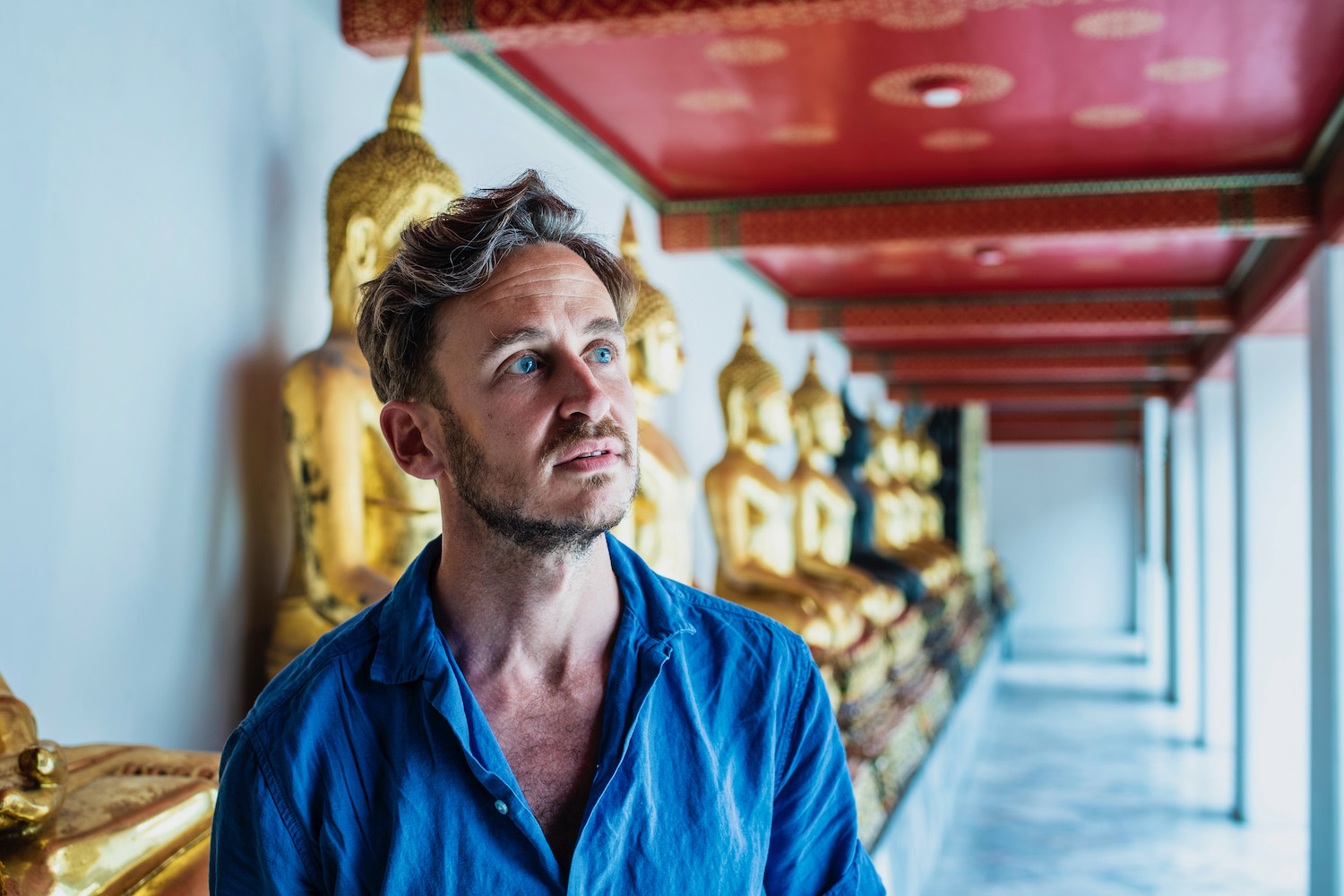The penultimate day of 2021 felt strangely like the penultimate day of 2020. And not just because I was staring down another new year with the same sort of bright-eyed, bushy-tailed hope I had as the last one loomed.
December 30, 2021 as on December 30, 2020, I found myself quarantined in an Asian country. Only in 2021, I was in one that actually wanted me there. At least I think that’s what the young woman at Piyavet Hospital, where I stopped on the way from Suvarnabhumi Airport to my hotel in Bangkok, was trying to tell me when she shoved a swab so far up my nose it stabbed my brain.
In Japan last year I simply spat into a tube, the painlessness of which masked a crueler backstory: Japan, in spite of how hard I worked to get there in the waning days of 2020, would’ve preferred if I’d rung in 2021 in my own country, rather than locked inside a Shinagawa hotel so sad it would’ve been tragic even outside the context of a pandemic.
With any luck I’ll welcome 2022 in relative freedom, assuming my welcome swab comes back negative for SARS-CoV-2. If it comes back positive then, well, I’ll be telling you a very different story than the one I hoped to write.
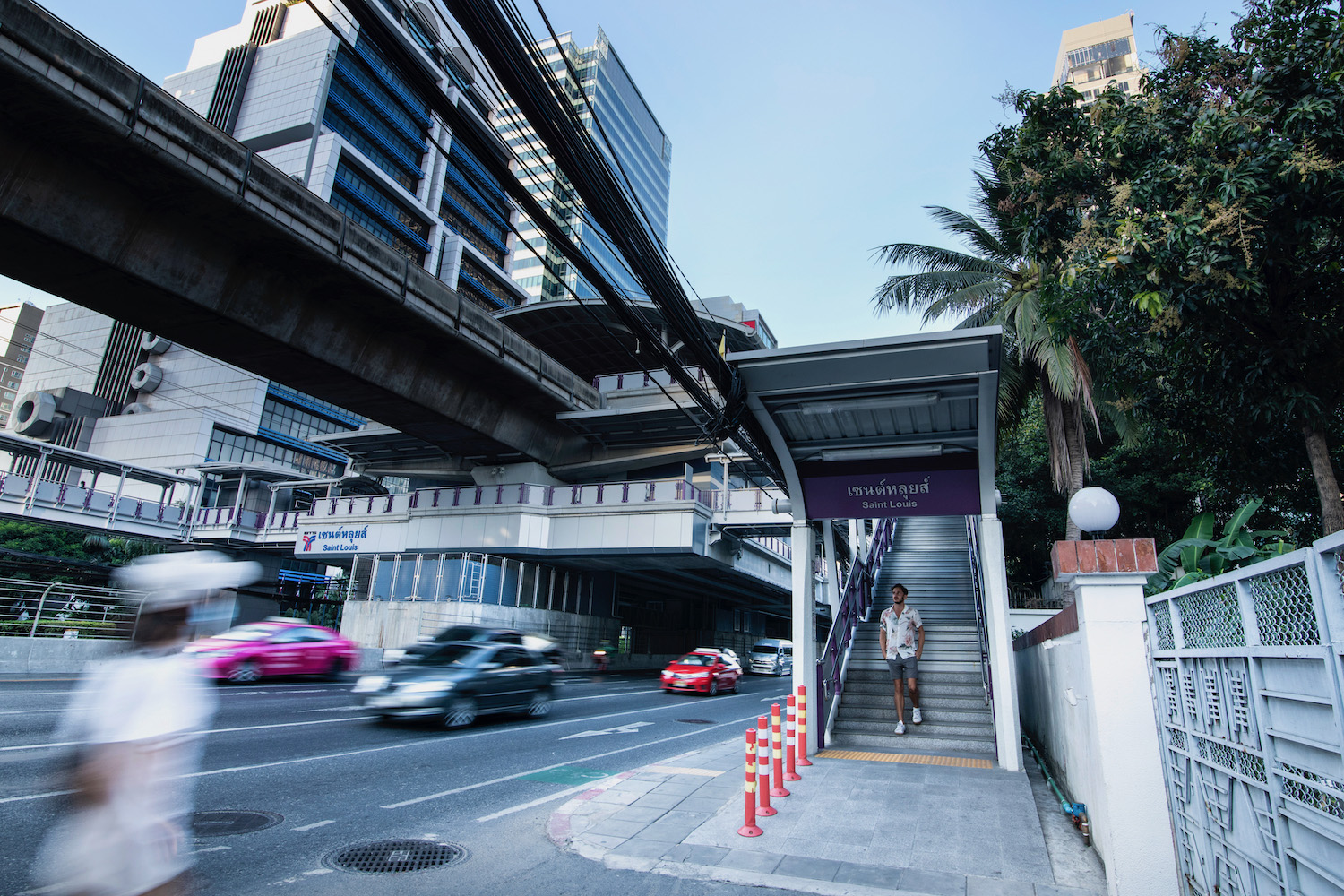
My Covid test result was negative, but the pathological nostalgia that has defined my relationship with Thailand’s capital for the better part of 12 years—there is no diagnostic test for this—was alive and well as I took to the streets my first morning as a free man.
Indeed, it isn’t accurate to say this affliction, if you can apply such an unpleasant term to something that feels so good, is non-physical. Walking down Soi Convent toward my old neighborhood, first past the motorbike taxi stand where I used to stop and catch rides before I saw my a dead body splayed out on Sathorn Road, I navigated using what I can only describe as muscle memory.
The cement sidewalk tiles that covered Bangkok’s poorly-hidden telephone infrastructure were like braille for my feet as I headed south. A former building just to the east of my least favorite Khaaw Man Gai stall in Silom had since been replaced by a corrugated metal wall during what seems to be an eternal construction project. As I passed BNH hospital, it didn’t faze me in the least that the umbrellas of my erstwhile first breakfast choice had been replaced.
The last time I ate here, in March of 2020 when I was in Thailand on business just days before the world changed forever, they had been a cheery rainbow spiral; today, McDonald’s sponsored them. What hadn’t changed was the way the Thai chili danced across my tongue, as it entered between bites and finely chopped chicken and holy basil, stir fried to the same perfection the woman behind the wok had served up since at least 2017, the first time I ate there.
Mounting the pedestrian flyover bridge, meanwhile, the putrid stench of the bougainvillea-lined khlong entered my nasal passages right on schedule—I didn’t even have to look down in the murky canal water to realize it was right beneath me. The traffic was lighter than it had even been during the 800 or so mornings I walked over the boulevard, but apart from this—and apart from the mask covering my face—this morning could’ve been any of those.
I gazed eastward toward Lumpini Park, where I used to run every morning, and which I had anxious walked through the day I ended up learning that SXSW 2020 was canceled.
“This will all blow over sooner than you can imagine,” I remembered my father telling me over the phone, while I’d used the same muscle memory now aiding me around the giant Bodhisattva tree still destroying the sidewalk at the top end of Thanon Suan Phlu to dodge Suan Lum’s joggers and monitor lizards. We obviously know how that went.
Continuing westward along Sathorn Road, the sun rising behind me to break thick clouds, I scurried up the staircase to the Chong Nonsi Skywalk, crossing diagonally over the crowded intersection below as I often used to do, peering down on the strange Starbucks store encased in what I can only describe as a glass Christmas tree before descending almost as fast as I’d ascended.
As I passed the W Hotel, where I’d spent so many Tuesday nights in 2018 drinking shitty, free-flow champagne all for a flat 100-Baht cover, the relative coolness of the late December morning began to lift: I was breaking my first sweat of the trip, which was a delight after having been cordoned off in my hotel room awaiting the all-clear on my PCR.
In the distance I noticed a BTS SkyTrain station where there didn’t used to be one: “Suksa Witthaya” was what it was supposed to have been called. The fare structure had accounted for it, of course—this is Thailand, after all.
Drawing nearer to the station entrance, using the same sort of muscle memory that had guided me down Soi Convent to my breakfast, it dawned on me that the depot had been renamed. Satanii Suksa Witthaya had finally opened—only it was called “St. Louis,” the name of my hometown.
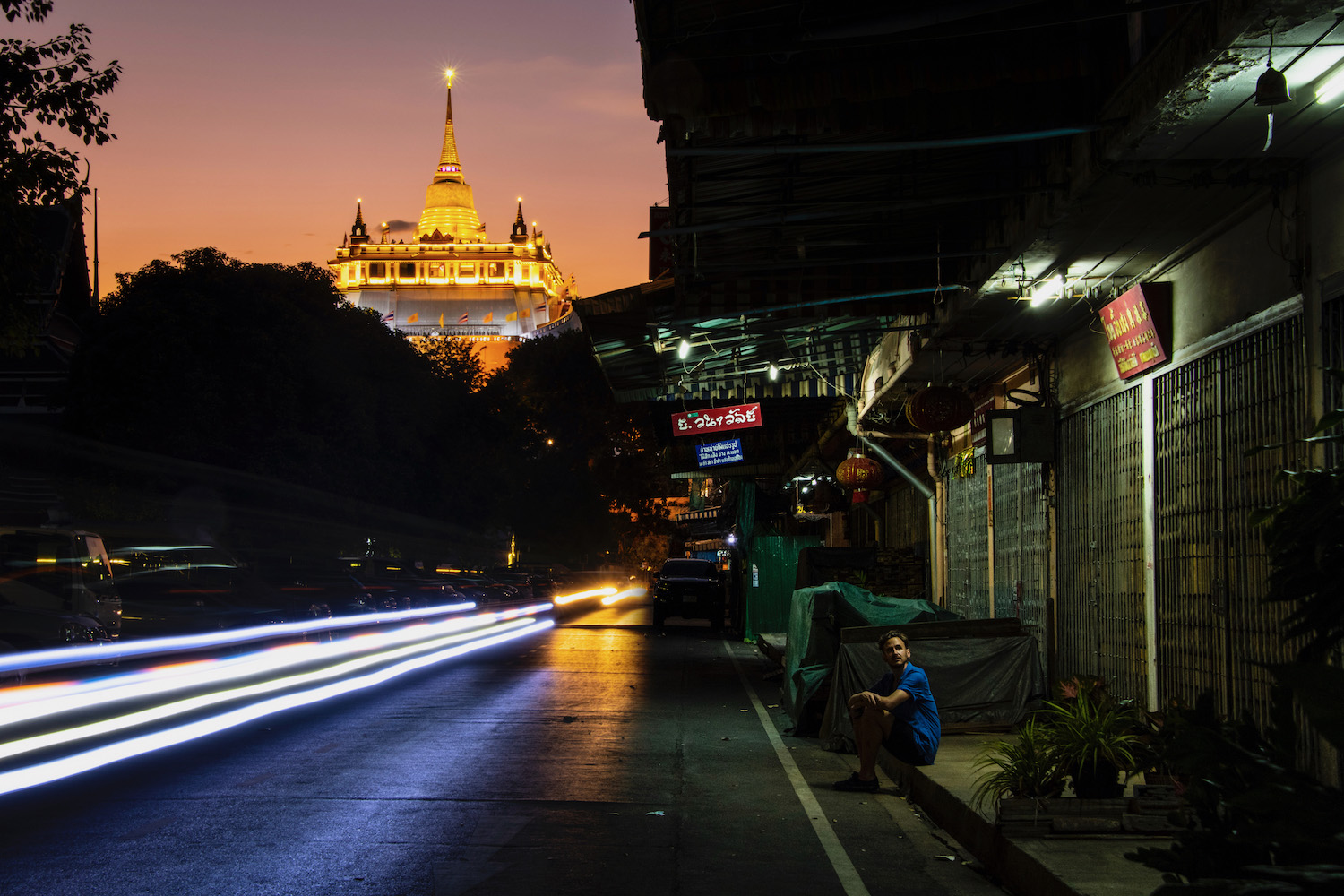
Six months ago, nearly to the day, I found myself at Tokyo’s Haneda Airport, doing something that would’ve seemed unimaginable even six months before that. In spite of having fought for the better part of a year to be able to enter Japan during its second Sakoku period, I was leaving the country I had only just started calling home.
The immediate reason had been my mother’s breast cancer diagnosis, but the bigger picture was even darker. Having lived away from St. Louis for 18 of my 36 years, more than four of those on the other side of the world in Asia, I could not bear the thought of watching my parents grow old and die (though hopefully not of cancer) over Zoom. So I willfully abandoned the only place I wanted to be, more than anything, to spend at least a few months around the people whose presence I needed.
In early autumn, a pair of fortunes from the Chinese takeout restaurant down the street from my apartment in St. Louis’ Dogtown neighborhood confirmed what I already knew: Traveling to the east will bring great rewards, the first had said. The second continued. You will take a risk, it will pay off.
I’d stuck them on my refrigerator, more as a reminder than of anything, as I counted down the weeks and then the days to my long-planned return to Thailand.
When I stepped into the turquoise shophouse just off Bangkok’s Charoen Krung Road on the last day of 2021, the sublime Pad Thai and Som Tam I knew awaited me were peripheral. The greatest rewards to be found here were contained in the kind eyes of my dear friend Nath, whom I’d last seen in late 2019.
Back then, during my first trip to the Kingdom since having moved to Taiwan that June, we’d traveled around the Andaman archipelago of Koh Yao together, him on the front of a motorbike and me on the back of it, and reminisced about our adventures in the capital in the years before that, which seemed like they had taken place decades earlier in spite of our relatively youthful appearances.
Our bond remained strong enough that we didn’t mess around with many pleasantries; that we had missed one another or that it was good to reunite were self-evident. Instead, after chowing down on delicious food (albeit food made far too un-spicy for a farang as accustomed to eating aahan phet as myself), we undertook a decision only two real friends would dare to do: Making the 20-minute walk to Hua Lamphong Railway Station, which both of us wanted to see before its imminent closure, under the blinding heat of midday.
“Welcome back to Bangkok!” Nath said un-ironically we entered into the historic terminal underneath a photo of King Rama V, the man who had brought trains (and, arguably, modernity) to Thailand in the first place. Somehow this did feel like an arrival, even if our perfunctory visit—our goodbye—to the station was touch and go; we were needed imminently at Si Phraya pier, where we had to catch one of Bangkok’s new zero-emission ferries up the Chao Phraya River to ancient Rattanakosin.
Nath, as always, indulged my creativity as I muscled-memoried my way from the Grand Palace to the Giant Swing, and from the Temple of the Reclining Buddha to the Golden Mountain. He didn’t complain even when I walked so fast—motivated, as always, by my desire to get the best shot—that I left him in my dust, sometimes so far I had to stop and turn around and go back to find him. At this stage in our friendship, unspoken and fundamental truths smoothed over what might seem like indignities or even disrespect to people less acquainted with one another.
“It’s not every day you’re in Bangkok,” Nath half-smiled, and said with a hint of sadness, after I jokingly apologized to him for how long I’d spent watching sunset behind Wat Saket. “Not anymore, at least.”
Compounding Nath’s unquestioning accompaniment of me on an otherwise selfish journey through Bangkok’s Old City was the date on the calendar. It was New Year’s Eve, and Nath literally could’ve been doing anything else.
“I never liked countdowns anyway,” he smiled as took a heaping spoonful of rose-colored yen dafo soup after we sat down for dinner right after night fell, just shy of 7 PM. “Or staying up until midnight.”
I wanted to nod in agreement—I was still jet-lagged; the thought of my soft hotel bed was almost erotic in its appeal at this level of consciousness. But the milky heat of my tom yum goong occupied both my sensory and cerebral minds; I was frozen, even though my heart was very much open.
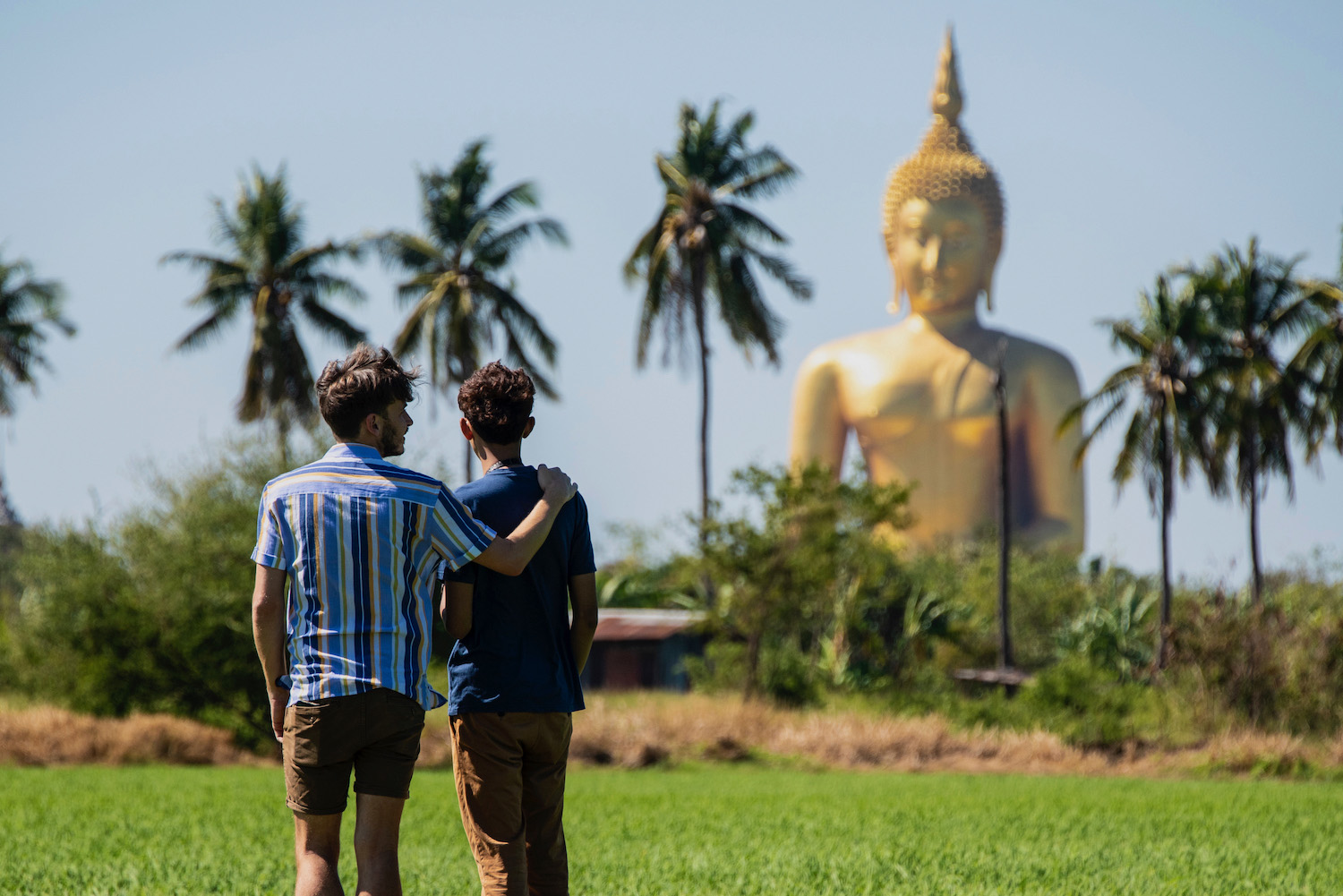
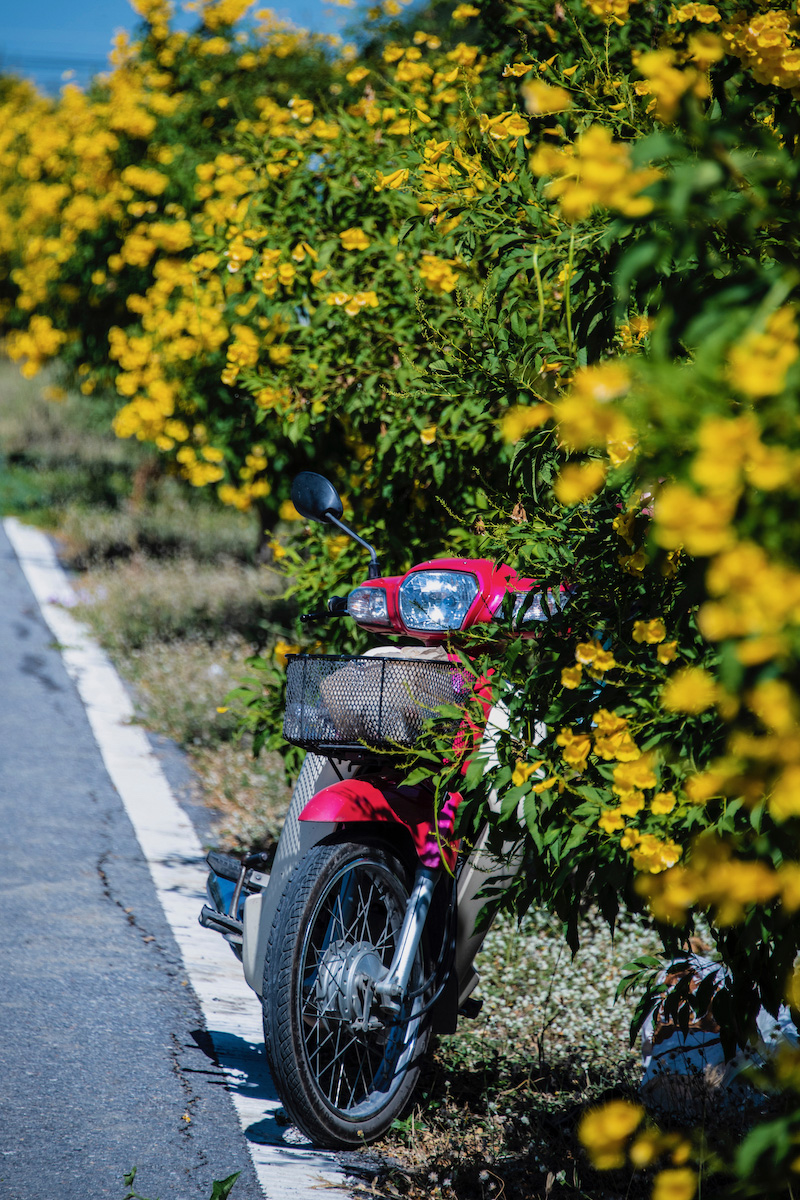
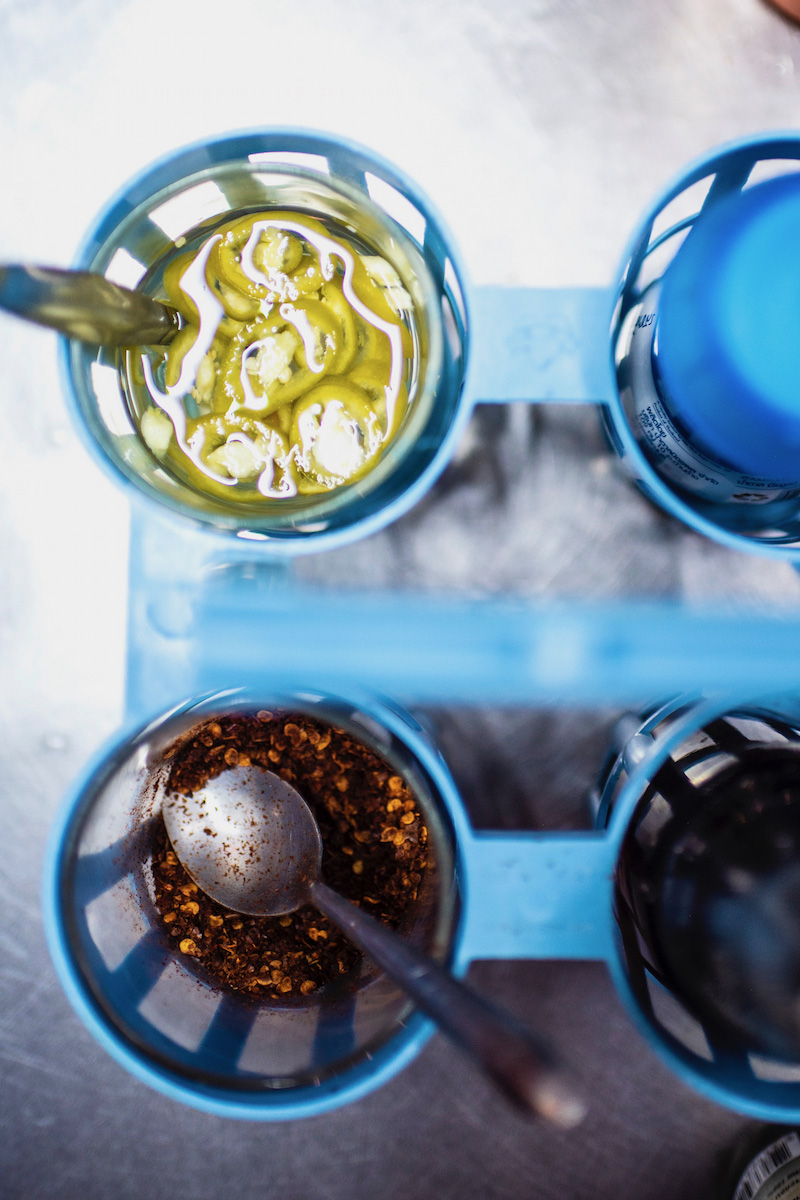
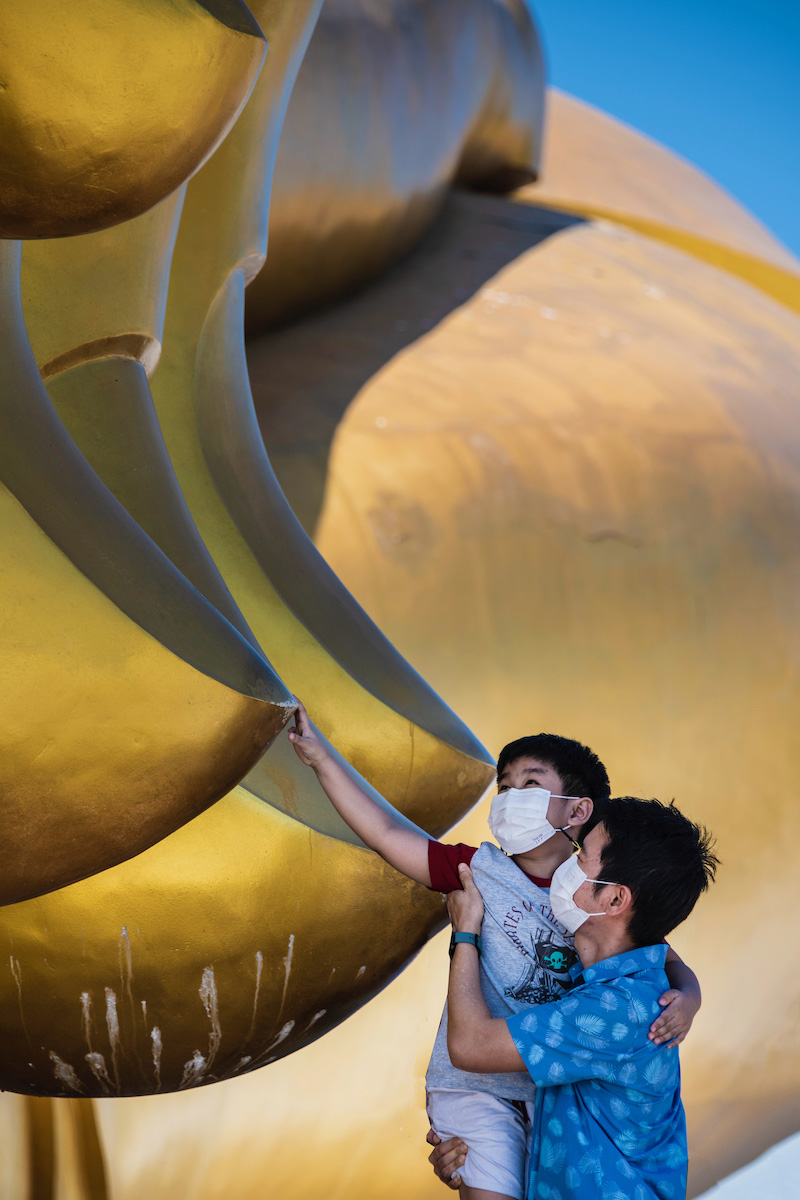
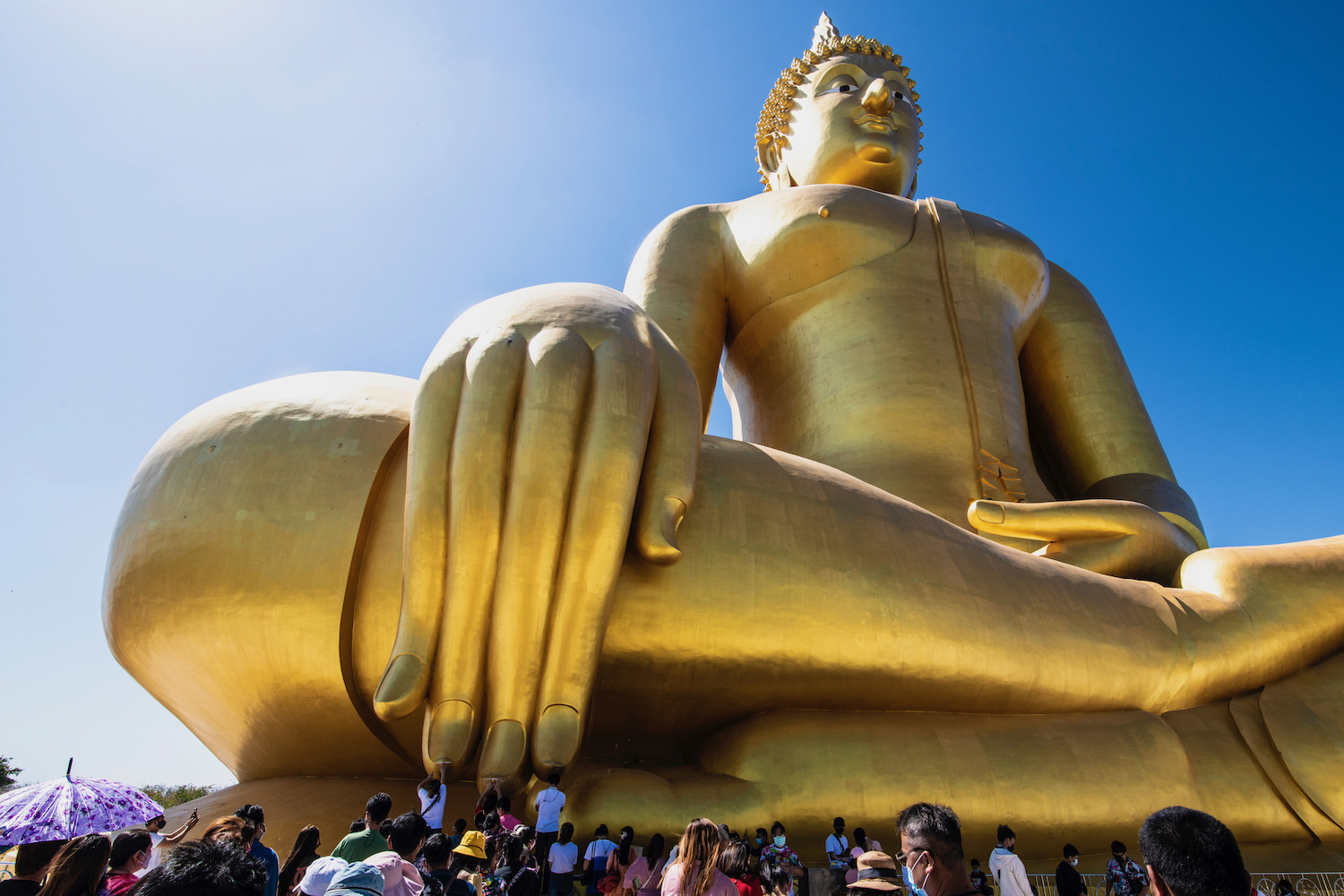
This morning, I received an email from myself. I hope you made it through, its six words—uncharacteristically brief for me—read.
I’d sent it via one of those “email your future self” services on July 25, 2020, while on an unplanned stop during a bike ride along the east coast of Taiwan, where I’d been living when Covid hit. By that time, the crisis had been going one for just four months—the end of it seemed as distant as the silhouette of Turtle Island in the distance. January 1, 2022 seemed far beyond the horizon, in my naive mind.
By the time the real January 1, 2022 rolled around I had indeed made it—I was alive and still am, the last time I checked—but not in the way I’d envisioned. As the sun rose, I was walking south down Ratchadamri Road, the lush green of Bangkok’s Lumpini Park to my left and the steel-reinforced cement of the BTS elevated railway above me to my right.
Mariah Carey’s “All I Want for Christmas is You” blared from over the road while just beside me on the sidewalk, a famished-looking chicken walked in circles around a homeless person’s sleeping bag, The smell of savory Thai chicken soup with white pepper, the kind you get when you order Khaaw Man Gai, masked the putrid stench of the ponds in Suan Lum.
In spite of the SkyTrain screeching overhead, I was on my way underground. I’d be riding the MRT to Chatuchak Park station to meet Nath, who would then navigate us to the cavernous Mo Chit bus terminal, where we’d apparently be able to find a direct bus to Ang Thong.
“New year, new adventure,” Nath said as we entered one of the vehicles foreigners fondly know as “death vans” because of how often they’re involved in road accidents. If you’re reading this, ours made it to its final destination intact.
Well, semi-final. “So how do we get to the Big Buddha from here?”
Before Nath could fiddle around in his phone to find the answer—apparently, there was as little information online about the subject in Thai as there had been in English—a woman in a black police uniform approached us. She seemed too young to be an officer of the law; she also seemed genuine in her desire to help us.
In normal situations, which is to say those where only English-speaking foreigners are present, you’d end an encounter with police in Thailand a few hundred Baht poorer, and without whatever you’d been seeking.
Today, Nath and I were inside a private police van with that unmistakable new car smell, chauffeured by one of the woman’s handsome colleagues, who posed for a selfie with us as a nondescript, upbeat Thai country song percussed under the haste we made to reach Wat Muang.
Along the road on either side, bushes covered in yellow trumpet flowers wafted in the unseasonable cool breeze, which wasn’t a breeze at all: It was fierce, like a clear-air gale. I’d had one—the bushes, not the gales—in front of the third house I called during my decade in Austin, but always forgot the name.
In college, one of my favorite books had been A Small Place, by Jamaica Kincaid. More an elongated rant than a novel or even a memoir, it tells the story of Kincaid’s native Antigua by shining a bitter, scathing light on the colonialism that usurped most of its former identity. “A tourist is an ugly human being,” began one of my favorite chapters, my fondness for which now seems somewhat ironic.
Certainly, I (and Nath by association) engaged in some ugly-human-being activity the first morning of 2022. In order to reach the famous viewpoint of the Buddha with palms swaying in front of it, we (or I should say I—Nath simply followed) had to trespass through a number of rice fields.
From the highway they’d seemed pristine and chartreuse. But wading through them, the only thing more overpowering than the faint smell of a fire burning, somewhere in the distance, was the sheer amount of plastic waste people had just left there.
We eventually did reach the spot and in that moment, as the golden statue towered in the distance up into the uncharacteristically blue sky, all the trepidation and anxiety I’d felt throughout the journey melted away, trespassing (and Nath’s conspicuous fatigued and sweating) be damned. A tourist is an ugly human being.
And yet both to this minor waypoint and overall, I had made it.
Before I started touristing professionally, a former friend of mine had suggested that the roving way it seemed I would self-actualize called to mind the story of Gautama Buddha, at least as told by Herman Hesse in Siddhartha.
Now, I would never compare myself to the buddha, but I did wonder: If I’m following anything close to a path of enlightenment, why have I been so resistant to veering off the course I’ve been charting for roughly 12 years, at this point?
I mean, in order to maintain my lifestyle—and livelihood—as a travel blogger during a pandemic, I had to spend a summer hiding from lockdown in Taiwan, and then arbitrage myself in Japan for six months under the (not entirely false) pretense of studying Japanese, to say nothing of all the undignified quasi-creative work I’d had to do to keep my bank account full.
While it was true that my routine for much of this time can only be described as monastic, I had never walked around barefoot begging for food, or even really compromised on my goals or desires. In fact, I was willing to uproot myself—and to say goodbye, over and over again, to the people I love most in the world—not so much to facilitate the journey, but in order to arrive, again and again and without fail, at whatever my preferred destination was.
After seeing the statue from afar, Nath and I had decided to visit Wat Muang itself, where local revelers literally wait in line to touch its massive fingers. They would pray for a moment—since it was New Year’s Day, I guess they’d make a wish—and then go on about their business. I didn’t think it was right for me to wait in that line and Nath didn’t want to.
But as we sped away, both of us crammed onto the seat of a motorbike taxi driver who’d been passing, the perfume of the yellow flowers from before awakened my memory. Esperanza, I reminded myself, as their sweet smell collided with the stench of an adjacent ditch. “Like sugar on shit,” as a friend of a friend had once described the bathroom of a karaoke bar we all used to frequent.
Hope, what a wonderful word to begin with. New year, new adventure.
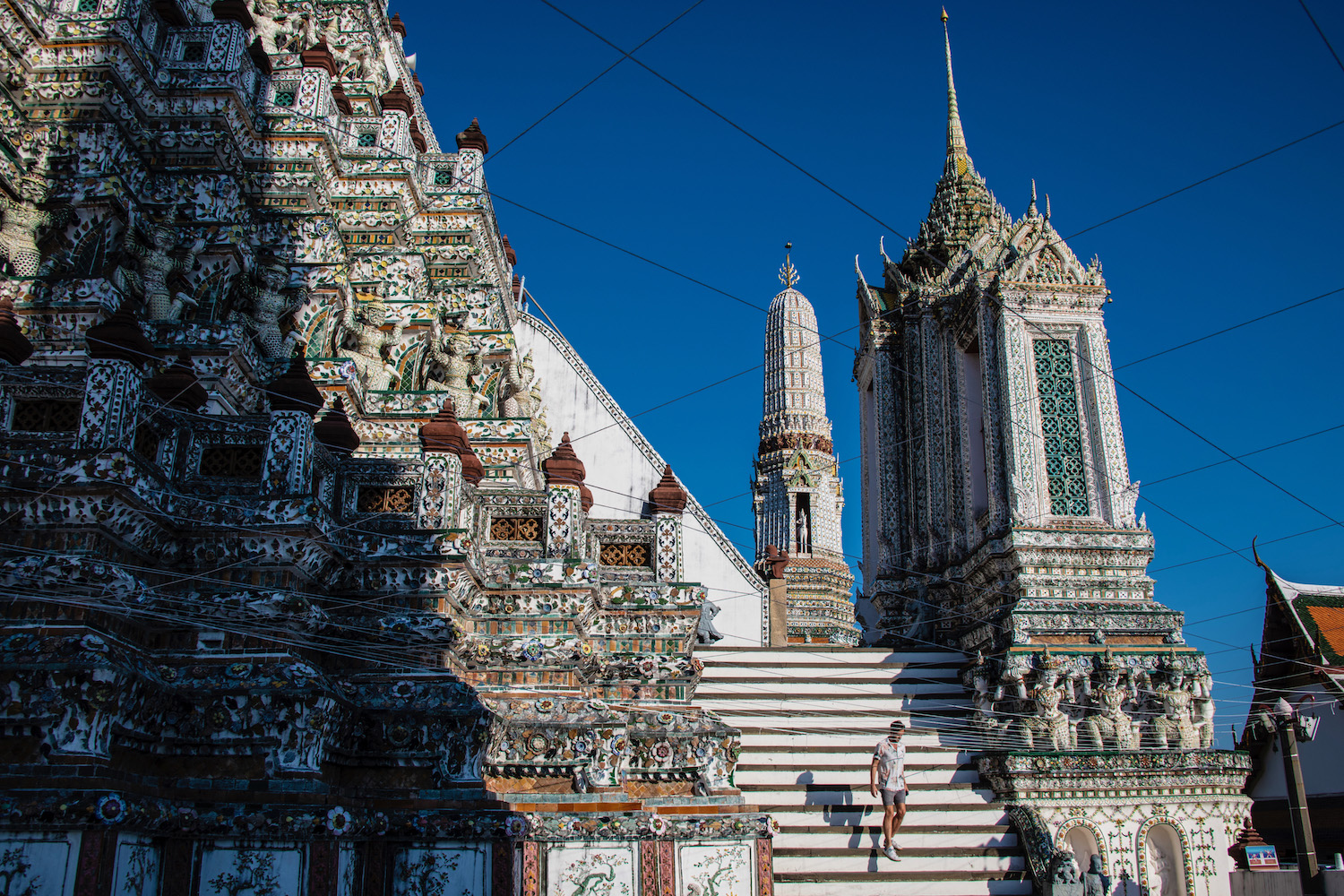
Sunday morning en route to the BTS station just past six, I noticed a familiar tune blasting from one of the shops at Velaa, a new upscale shopping complex popular among the foreign embassy staff who live in Langsuan.
The song itself—Belinda Carlilse’s “Heaven is a Place on Earth”—didn’t surprise me as much as the fact that it was playing at all, certainly at this hour. Silence is a commodity in Bangkok, one the wealthy and well-connected value especially.
Yet the the song itself was evocative, and not just because of the Black Mirror reference some of you are probably expecting. In mid-2018 while I was living here, I bumped into a man I hadn’t seen since 2011 in Mykonos. I had slept with one of his friends after a long night out—I could’ve chosen either of them.
We began a strange but short quasi-courtship that never resolved into anything, but I did learn one detail: Belinda Carlisle lives in Bangkok, and has for some time. He mentioned that he knew her and that we could all hang out sometime, but that—like even the slightest semblance of physical chemistry between us—never came to pass.
As far as why I’d been out at dawn on the first Sunday of the year? Not ironically I was headed to Bangkok’s Temple of Dawn, Wat Arun. In spite of the clue about when to visit very much being in its name, I’d always preferred to capture its iconic shape just after dusk, when it lit up and reflected in the waters of the Chao Phraya.
Sunday was an exceptionally sunny morning, even from within the polarized windows of the new zero-emissions ferry that run up and down the river. Even the heron perched atop one of the invasive hyacinth tufts floating its way downstream toward the Gulf of Thailand had to shield its eyes.
But I leaned into it: The contrast of the sky’s piercing cerulean with Wat Arun’s ivory, which had been restored years earlier from a crumbled grey, was heroin for me as a photographer—I live for it, and the crisp, clean shadows it casts.
That the clarity of the sky persisted long enough for me to ride the ferry over to Wat Pho, and to sit down for one of Bangkok’s best jok congees before traipsing amid its towering stupas, was a testament to the good fortune the first Sunday of the year had heralded. New year, new luck.
I ended my morning by rounding out time in Thonburi and Rattanakosin by walking (barely) down into Yaowarat, Bangkok’s Chinatown. I hadn’t been to the Pak Khlong Talat Flower Market since a press trip in early 2014; I was curious to see how differently I might see it.
Although the market’s stalls were overflowing with fresh orchids and roses and jasmine lanyards and marigold sashes, it was the smell of the dried flowers that perfumed the entire experience, which was merciful given Chinatown’s proximity to its namesake khlong—if you think Venice’s canals are filthy, don’t come within a mile of one of Bangkok’s.
Only the particular scent of dried flowers, which many sellers made themselves by hanging newly-cut bouquets upside down over their storefronts, could mask the ambient stench, like the way fresh ones do at a funeral, when they overpower the formaldehyde just enough to make the situation bearable.
Bangkok, for all its warts, is nothing if not a city that is fully alive. I made this conclusion before I even technically set foot here back in February 2010, as I sped into the city center from the southern bus terminal on the back of a motorbike taxi, at dusk right when the neon lights of Rama I Road leading from Chinatown toward Siam Square were starting to strobe.
Of course, the flip-side of rediscovering my love for Bangkok, and acknowledging its longevity, its accepting that I spent far too much of the time I lived here angry and ungrateful. After finishing up at the flower market I rode the MRT to Phra Ram 9 station, where I stopped at the hospital of the same name to take my required second PCR test.
While waiting for someone in a negative pressure room to swab my nose behind plexiglass and gloves as blue as the morning sky, I read through the some of the old chat messages I’d sent to friends and strangers, particularly in late 2018 and 2019, as my time in Thailand’s City of Angels was getting close to expiring.
That evening, after returning to Rattanakosin and watching sunset behind Wat Arun for old time’s sake, I put on YouTube while editing photos; its algorithm lured me down a rabbit hole of 80s music. What started with some of my favorite hits by Paula Abdul and Whitney Houston (but not, surprisingly, Belinda Carlisle) was a song I knew but also didn’t remember: “Waiting for a Star to Fall.”
It was an out-of-body experience. I hadn’t heard this song in at least 30 years; I literally did not remember it existed. And yet I knew every word and melodic turn, and could practically see the harsh mid-day light reflecting in my mom’s sunglasses as we drove north on I-270 to West County Mall, probably en route to having our favorite pizza.
It was emotional muscle memory, not unlike the physical one that allows my feet to navigate around Bangkok even when my mind is distracted. The song, while cheesy and very much of its time, grew more bittersweet each time I listened to it, in spite of its dramatic sax solos (there are more than one), upbeat message and vibe.
It reminded me not so much of my early childhood, which by all accounts was unremarkable, but of my mom being young, which is the way I always remember her when we aren’t together. That my mother was young but isn’t anymore is also not remarkable.
And yet it was incredibly relevant to the conflict that has stirred in my soul since returning to Bangkok: Being here feels so right it scares me.
Monday morning, as I sat at my computer tackling my to-do list (including working on this essay), a red light reflecting off the skyscrapers of Silom caught my eye. I made my way to the window, where I became almost paralyzed by what was probably one of the most majestic sunrises I’ve ever seen in Bangkok. The day’s nascent light painted blanket of clouds above the skyscrapers and the temples of the slums of Khlong Toei in fluorescent shades of coral and amber, like gel food coloring swirled through white buttercream.
Heaven, as the old song goes, is a place on Earth. But is it just this one, or is it all of them?
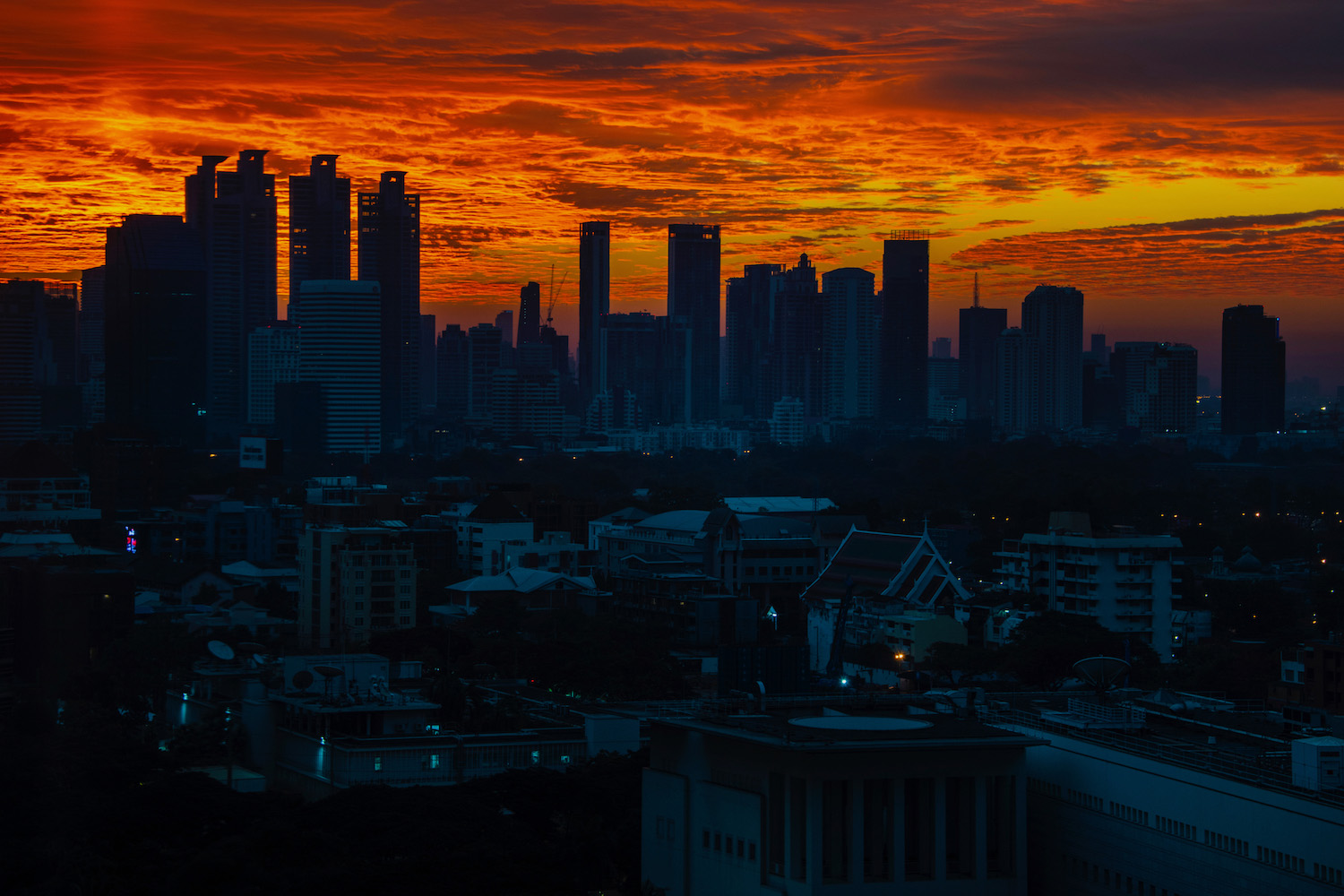
A week into 2022, I am thankful to my past self who, in spite of his neuroses—or maybe because of them—created the future that is now my present.
And yet I am also feel contempt for him. His decision to have lived globally has largely ruined domestic life for me. He has left me with the task, maybe an impossible one, of reconciling these two parts of myself.
Indeed, not all the deja vu of being in Bangkok today is pleasant. It feels like March of 2020 as I watch the world shit its pants over omicron, front the same Suan Phlu street food stalls where I watched the original hysteria. (Reviewer’s note: the sequel is even worse).
If I were to believe my former friend when she characterized me as Siddhartha, I might simply see the insanity of the world as a sign to move on to the next step of my journey, to abandon the freedom and abundance I’ve enjoyed and perhaps become a brahmin or a beggar.
But how can Peter Pan come down to earth, willingly, after he’s finally figured out how to stay aloft full-time? Does he? Should he?
On my last night in Bangkok—for now, I’ll be back in three weeks—I ascended for the Mahanakhon SkyDeck for the first time. When I lived here I’d look out on this building, currently Thailand’s tallest, from my apartment. Upon reaching the precipice, the first thing I did was hone on in my old balcony.
As night slowly fell, I stood silently and observed the scene beneath me. I wondered what my future would bring—would I spend most of my time back in St. Louis as planned, or would Bangkok play a larger role than I’d expected when I decided to travel back here, ostensibly on vacation?
I waited for a sign—for a star to fall, you might say—but none appeared.



